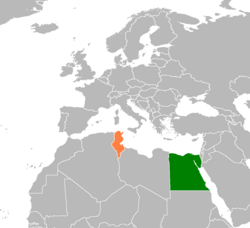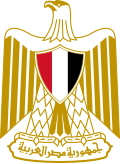Egypt–Tunisia relations
This article's tone or style may not reflect the encyclopedic tone used on Wikipedia. (September 2019) |
 | |
Egypt |
Tunisia |
|---|---|
Egyptian–Tunisian relations refers to the bilateral relationship between Egypt and Tunisia, two North African countries. Both countries are members of the Organisation of Islamic Cooperation, Union for the Mediterranean, African Union and United Nations.
Antiquity to medieval relations
Egypt and Tunisia were homes of two of the earliest and oldest civilizations in Africa: the Egyptian civilization and Carthaginian civilization. Trade between Carthage and the Ptolemaic Kingdom was successful. Nonetheless, rivalry existed between the two countries, as the Egyptians sometimes exhibited hostility towards the Carthaginians.[1] This complicated relationship between the two nations would remain until the end of antiquity and beginning of medieval eras.[2]
The war elephants of Hannibal, which took part in his failed attempts to conquer Rome, were thought to have been traced back to Egypt.[3]
Both Egypt and Tunisia were ruled by various empires: the
With the Ottoman conquest, Egypt and Tunisia were placed under the Turks. Ottoman Egypt and Ottoman Tunisia both functioned as autonomous provinces of the empire, but their relationships with the empire were different. Ottoman Tunisia, in majority, remained loyal to the Ottoman state and was one of the earliest regions to support the Tanzimat, which included the abolition of slavery in 1846, making Ottoman Tunisia one of the first countries to abolish slavery.[6] It was also among the most liberal parts of the empire.[7] On the other hand, Egypt had a number of conflicts with the Ottoman state, dating back to the Ottoman–Mamluk Wars[8] and later Egyptian–Ottoman Wars;[9] at the same time, Egypt supported the Ottomans in various Ottoman wars.[10] This backlash of relations between Egypt and the Ottoman Empire further developed with its own different view that would eventually escalate into the 20th century under Gamal Abdel Nasser. Overall, Tunisia's relations with the Ottomans were deemed as good while Egypt's relations with the Ottomans were mostly complicated.
In the late 19th century, both Egypt and Tunisia were colonized by the
Modern relations
When Tunisia gained independence in 1956, Egypt and Tunisia established relations due to the efforts of Habib Bourguiba, who had previously studied in Egypt.[14] Egypt and Tunisia maintained a cordial relationship, with Egypt and Tunisia on a common front against Israel. However, after Anwar Sadat signed the Egypt–Israel peace treaty at 1973, the relationship between two soured, though not directly, as Tunisia had refrained from engaging against Israel unlike Egypt prior to Sadat.[15] It was not until the late 1980 s that Egypt and Tunisia restored ties, but Tunisia was able to maintain low-key relations with Egypt.
In 1985, Israel launched Operation Wooden Leg, attacking the headquarters of the Palestine Liberation Organization in Tunis, which prompted anger from Tunisians.[16] Egypt was one of the nations to condemn the attack, helping to warm its relations with Tunisia. After the end of the Cold War, Egypt and Tunisia re-approached and established a strategic partnership.
Arab Spring
The outbreak of the Arab Spring drew strong support from both Tunisians and Egyptians alike, since they were the two earliest Arab nations to be influenced by the revolution.[17] Despite this, only Tunisia was successful in transforming into a democracy; Egypt, on the other hand, saw a second change of regime and even more unrest, although it was able to fully avoid civil war unlike Syria, Yemen, Iraq and Libya.[18]
Despite the Spring, the two countries' social issues remain unsolved. Radicalization of young people and Islamists alike,[19] along with unstable economic conditions, have led to the two countries remaining corrupt even after the Spring.[20]
Cooperation
In 2019,
There are educational exchanges between Egypt and Tunisia on many fronts.[24]
Diplomatic missions
See also
References
- ^ "How were relations between Carthage and Ptolemaic Egypt?". History Forum. Retrieved 31 March 2019.
- ^ "Ptolemaic-Carthaginian Relations". UNRV Ancient Roman Empire Forums. 10 August 2007. Retrieved 31 March 2019.
- ^ Wilford, John Noble (18 September 1984). "The Mystery of Hannibal's Elephants". The New York Times. Retrieved 31 March 2019.
- ^ "Egypt - From the Islamic conquest to 1250". Encyclopedia Britannica. Retrieved 31 March 2019.
- ^ "Great Mosque of Kairouan - Kairouan, Tunisia". Sacred-destinations.com. Retrieved 31 March 2019.
- ISBN 978-0813044828.
- ^ "Women, Gender, and the Palace Households in Ottoman Tunisia By Amy Aisen Kallander". Utpress.utexas.edu. 5 June 2013. Archived from the original on 30 December 2020. Retrieved 31 March 2019.
- ISBN 9004101802.
- ISBN 0275986012.
- S2CID 159757281.
- S2CID 143357206.
- ISBN 9780190277734. Retrieved 31 March 2019 – via oxfordre.com.
- ^ Taylor, Alan. "World War II: The North African Campaign - The Atlantic". Theatlantic.com. Retrieved 31 March 2019.
- ISBN 9781349221776. Retrieved 31 March 2019 – via Google Books.
- ^ Ghiles-Meilhac, Samuel (25 November 2014). "Tunisia's relations with Israel in a comparative approach. The case of the debate on normalisation during the Arab Awakening". Bulletin du Centre de recherche français à Jérusalem (25). Retrieved 31 March 2019 – via journals.openedition.org.
- ^ Margalit, Michal (1 December 2015). "Thirty years later, Hattab family loses another member to anti-Semitism". Ynetnews. Retrieved 31 March 2019.
- ^ "Archived copy". Archived from the original on 31 March 2019. Retrieved 28 March 2019.
{{cite web}}: CS1 maint: archived copy as title (link) - ^ Editorial (16 January 2014). "The Arab spring: made in Tunisia, broken in Egypt". Theguardian.com. Retrieved 31 March 2019.
- ^ Hamid, Shadi (30 November 2001). "Radicalization after the Arab Spring: Lessons from Tunisia and Egypt". Brookings.edu. Retrieved 31 March 2019.
- ^ Mourdoukoutas, Panos. "'Arab Spring' In Vain: Tunisia And Egypt Remain Corrupt". Forbes.com. Retrieved 31 March 2019.
- ^ "Egypt, Tunisia agree to strengthen counterterrorism cooperation". Middle East Monitor. 25 February 2019. Retrieved 31 March 2019.
- ^ "Egypt, Tunisia sign 10 agreements during cooperation talks". Egypt Independent. 12 November 2017. Retrieved 31 March 2019.
- ^ "INTERVIEW: Egypt, Tunisia have opportunity to boost economic relations, says Tunisian PM Youssef Chahed - Politics - Egypt - Ahram Online". English.ahram.org.eg. Retrieved 31 March 2019.
- ^ Faour, Muhammad. "Religious Education and Pluralism in Egypt and Tunisia". Carnegie Middle East Center. Retrieved 31 March 2019.
- ^ "Egyptian Embassy in Tunis, Tunisia". Consul.info. Retrieved 31 March 2019.
- ^ "Mission". www.diplomatie.gov.tn. Archived from the original on 28 September 2020. Retrieved 25 January 2022.
Further reading
- Egypt-Tunisia relations
- A comparative historical analysis of the Ulama and the state in Egypt and Tunisia


